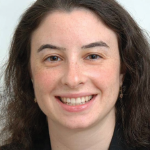 Julia Manasson, MD
Julia Manasson, MD
Post-Doctoral Research Fellow, Division of Rheumatology, New York University, New York City
Background: Echoing many of this year’s award winners, Dr. Manasson says it’s a great time to be a rheumatologist, with “new, cutting-edge therapies available for conditions that used to be untreatable.”
Born in Ukraine, she grew up in California and graduated from Princeton University, majoring in ecology and evolutionary biology. Following medical school at Boston University, she did her internal medicine residency and rheumatology fellowship at NYU. During residency, under the mentorship of NYU rheumatologist Jose Scher, MD, she contributed to a large-scale study characterizing the microbiota in subjects with rheumatoid and psoriatic arthritis. She assessed the fecal proteins and pro-inflammatory cytokines in the gut to ascertain the amount of local gut inflammation.
Her research focuses on the impact of the microbiome in spondyloarthrits. “I’m exploring the cutaneous microbiota of patients with psoriasis and psoriatic arthritis, comparing them to healthy individuals who lack the disease,” she says. “The ultimate hope is this will provide insights into the pathogenesis of the psoriatic disease spectrum, and the transition from skin disease to joint disease.”
An oral presenter at the Group for Research and Assessment of Psoriasis and Psoriatic Arthritis (GRAPPA) Annual Trainees Symposium in 2016 and 2017, she earned a GRAPPA Pilot Research Grant. She presented at the National Psoriasis Foundation 2017 Research Symposium, and received a 2017 NPF Early Career Research Grant. She is also an avid juggler.
‘Spend time pursuing endeavors you find interesting & fulfilling, even if they don’t seem immediately useful.’ —Dr. Manasson
Q: What’s the most fulfilling part of your career in rheumatology?
A: I’m very fortunate to have trained at NYU, where the rheumatology division, in general, and the fellowship program, in particular, are uniquely strong in both the clinical and research aspects. I’ve worked with smart, experienced clinicians on complex cases. I truly feel as though we make a difference in the lives of our patients. At the same time, I love my research and am excited to work on my projects while developing my niche and skillset as a physician-scientist.
Q: What has the ACR meant to you?
A: Being able to attend the ACR/ARHP Annual Meetings has been a valuable resource to learn about the latest breakthroughs in research, and to build collaborative relationships with my colleagues.
Q: What advice do you have for the next generation of rheumatology fellows?



